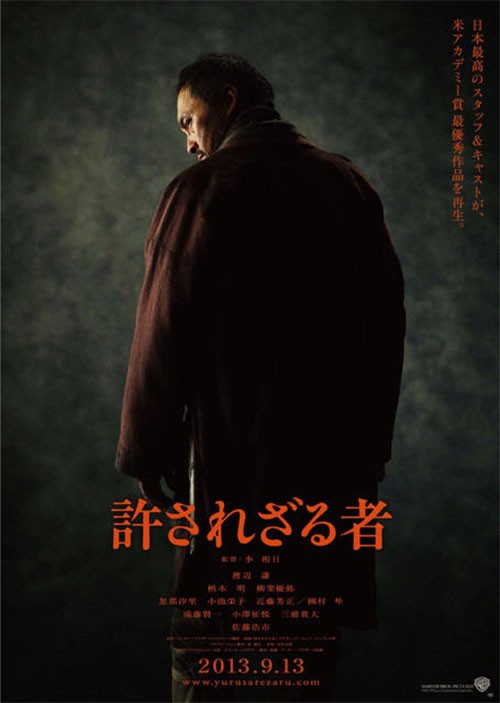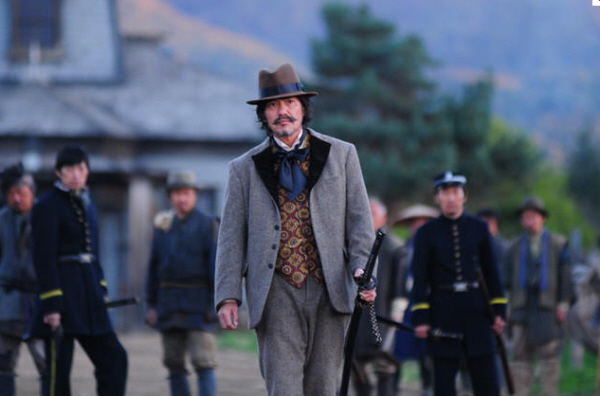NBFF 2014 Review: ‘Unforgiven’
 Monday night at the Newport Beach Film Festival saw a film that I have been anticipating for some time be represented as the Japanese Spotlight feature of the night. I was quite happy to have seen it. The Japanese remake of Unforgiven makes a good case for why I am never against the idea of a remake, before I actually see it or have enough information to pass judgment. Clint Eastwood’s 1992 Best Picture winner is the film I consider to be his best work as a filmmaker (and as an actor, for that matter), so the concept of remaking his film should presumably strike ire in the hearts of those that claim remakes are always terrible. Of course, hypocrisy is a funny thing, as the reaction to Ken Watanabe starring in a samurai version of the same story seems to have made most skeptics excited about this particular idea. Still, this is not about the public at large, it is about what I thought of the film, which basically amounts to being an interesting remix.
Monday night at the Newport Beach Film Festival saw a film that I have been anticipating for some time be represented as the Japanese Spotlight feature of the night. I was quite happy to have seen it. The Japanese remake of Unforgiven makes a good case for why I am never against the idea of a remake, before I actually see it or have enough information to pass judgment. Clint Eastwood’s 1992 Best Picture winner is the film I consider to be his best work as a filmmaker (and as an actor, for that matter), so the concept of remaking his film should presumably strike ire in the hearts of those that claim remakes are always terrible. Of course, hypocrisy is a funny thing, as the reaction to Ken Watanabe starring in a samurai version of the same story seems to have made most skeptics excited about this particular idea. Still, this is not about the public at large, it is about what I thought of the film, which basically amounts to being an interesting remix.
Set in 1869 Japan, at a time nearing the end of the samurai, Ken Watanabe stars as Jubei Kamata, a legendary samurai, known for his ruthlessness in the past. Jubei currently lives a quiet life on a farm, where he takes care of his two children by himself (his wife passed away three years earlier). Jubei is recruited by a former associate, Kingo Baba (Akira Emoto), to assist him on a mission to kill two men who scarred a prostitute in a remote village and have basically gotten away, with no punishment. Jubei reluctantly accepts the mission, which will put him back into action, after years of staying away from the violence he was so comfortable with committing. As the men head towards their mission, we also have focus provided on the town, which is ruled over by a vicious chief of police, Ichizo Oishi (Kôichi Satô). Things will eventually come to a head, as the former samurai must put his own demons into perspective, while putting a stop to some of the ones that currently exist in reality.
For some broad thoughts on the film, it should be clear that Unforgiven is a clear-cut remake of the original film. There is virtually no difference in the story being told, aside from the placement of certain scenes and some minor changes here and there to better adjust for the fact that this is now a Japanese samurai story, as opposed to a western. It makes a lot of sense to see a film like this remade in such a way, but it does become more interesting to see the reversal, given that so many westerns have been inspired by the many samurai films that came before them. Among the many, Yojimbo became A Fistful of Dollars (which starred Eastwood), Seven Samurai became The Magnificent Seven, and now Unforgiven has now gone the other direction, which makes for an interesting comparison, given what Unforgiven functioned as.
I find Eastwood’s Unforgiven so interesting due to the fact that it stands as a revisionist or anti-western. While the film certainly has the appropriate setting of a western, it was a film that did not take pride in showing off the violence. It is in fact brutal and uncomfortable to watch, which is evident not only in the lack of flashiness, but in the eyes of the characters we follow. Adding to that was the presence of Eastwood as a career outlaw who has tried to reform himself. Given that Eastwood spent the better part of his early career playing western heroes praised for the work he did as basically a murdering bounty hunter, there is an extra layer of subtext added to the notion of him playing a guy that feels ashamed of his past. It is because of all this that the Japanese take on Unforgiven does not provide enough in the metanarrative to stack it against the original film, regardless of how well-acted and well made it may be.
Make no mistake, if there was one actor I could currently name to take over the role that Eastwood turned into a career-best for himself, it is Ken Watanabe, as he has the sort of stature and gravitas to make a character like this work (a handful of others come close as well, but it serves more as a way for me to simply keep recommending The Twilight Samurai, an excellent, more recent samurai film). Watanabe fills his role with the appropriate amount of pathos and reflection to best get across what this kind of mission means for him. He may not, at least not to my knowledge, have a back catalogue that makes the casting choice feel all the more appropriate, compared to Eastwood, but he does a great job at creating a character that many within the film can express their regard for, in terms of the legacy and infamous nature of who Jubei once was.
Director Sang il-Lee, who also adapted the screenplay originally written by David Webb Peoples, does a fine job with the material. I would be interested to learn more about what kind of interaction he had with Peoples and even Eastwood during the making of this film, but as it stands, Unforgiven looks fantastic in its depiction of this stage in Japan’s history, reflecting the downfall of a particular era and the stragglers with violent pasts who are still around to find their place in a changing world. With Jubei, it is an attempt to tuck himself away and do his best to not have his family know or become anything similar to his younger self. For Ichizo, it is about taking his own violent history and judging other, similarly violent, figures he comes across and making it clear that he won’t stand for what he considers injustice. He is happy to fight that with his own version of justice. Gene Hackman won an Oscar for his portrayal of this character and while Kôichi Satô does a good job of playing a mean sonuvabitch, the film can only do so much to create more of a punch to seeing this kind of figure again.
Yes, I am basing a lot of my thoughts on how this stacks up to Unforgiven and it is something I always flirt with doing, when it comes to reviewing remakes, but how does one not talk about Eastwood’s film? It is not an obscure property, but a modern classic. It also stands to reason that commenting on a film that serves as the remake to a film that commented on a genre that was largely inspired by the genre that this current version falls under is one of the more interesting remakes to come about. With that in mind, I am happy to accept the confidence in which this film was made, it just serves little purpose in the grand scheme of things, beyond the neat idea that it exists.
The knocks against it certainly do not reflect a bad film though. Unforgiven is quite good. It is well-acted, looks great, finds a way to balance the impending action with the drama the builds up to it, and is appropriately violent in a way that is shot creatively enough, but still serves the purpose of taking away the glamor of these older warriors. It plays as more of a remix of an already highly-praised piece of work, but one that is still worth checking out. In a time when there are plenty of properties being brought back to life that no one asked for, this take on Unforgiven at least allows for some interesting consideration of what the original meant and how far we have come in the world of samurai and western films inspiring one another.
![]()
![]()
![]()
![]()
![]()

Click on the poster to visit the Newport Beach Film Festival website,
and be sure to check back to Why So Blu throughout the week
for more of my coverage of the festival!
Aaron is a writer/reviewer for WhySoBlu.com. Follow him on Twitter @AaronsPS4.
He also co-hosts a podcast, Out Now with Aaron and Abe, available via iTunes or at HHWLOD.com.






















This just moved up to the top slot in my “must see” list
Great review, Aaron!
Thanks C! 🙂
Nice! I’ve been wanting to check this out for a while now!
weight loss diets
NBFF 2014 Review: ‘Unforgiven’ at Why So Blu?
adiphene best price
NBFF 2014 Review: ‘Unforgiven’ at Why So Blu?